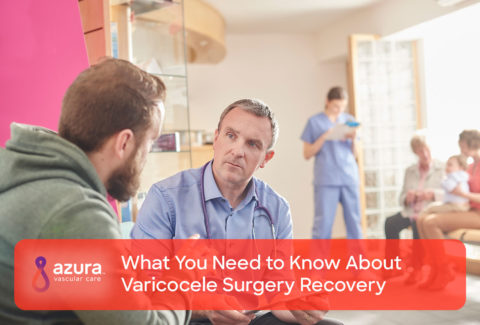
Approximately 15 percent of men in the general population suffer from varicoceles.[i] This condition, which often begins in adolescence, may cause sustained pain and discomfort. Varicoceles are also linked to infertility in that the dilated veins result in poor return of blood from the scrotal veins back to the systemic circulation, which results in elevated temperatures in the scrotum. The increased scrotal temperature is believed to contribute to a decline in viable quality sperm.[ii]
Most men who have been diagnosed with a varicocele have surgery to correct this problem. But what is involved in varicocele surgery, and are there any alternative treatments available? Below is what you need to know to help you decide on a surgical procedure to treat your varicocele.
RELATED: A Glossary Guide to Varicoceles
What Is Varicocele Surgery?
There are three surgical approaches used to treat varicoceles. They are:
No matter which surgical approach is used there will be an incision and stitches and some form of anesthesia will be required.
Questions to Ask Your Doctor
There are a number of questions to ask your doctor before you choose varicocele surgery, such as:
- What might happen if I delay or avoid surgery?
- What results should I expect from surgery?
- Will I be able to have children after surgery?
- How long will it be until I can have sex after surgery?
- Are there any less invasive or non-surgical options?
 What is the next step if surgery doesn’t work?
What is the next step if surgery doesn’t work?- How much does varicocele surgery cost?
- Is varicocele surgery an outpatient procedure?
- Where will the surgery be performed?
- Who will perform the surgery?
- How long will the surgery take?
- What type of anesthesia will be used?
- What are the risks?
- Will a biopsy be done?
- How long will recovery take?[iv]
Preparing for Varicocele Surgery
Regardless of what surgical method is used, there are some basic things every man will need to do before going in for surgery. Preparation really starts the day before surgery. Below are some things you may be asked to do.
- The night before surgery you may need to shave your groin area, including the scrotum and base of the penis. You do this the night before in order to avoid skin irritation on the day of the surgery.
- Don’t eat after midnight. Your surgeon may also restrict your diet the day before your surgery and could even set a limit on liquids.
- Shower or bathe in the morning and wash the surgical area. A mild soap is recommended so your skin won’t be irritated.
- Ask your doctor beforehand about medications, especially if you take diabetic or blood thinning drugs. Take your medications as directed by your surgeon. Take any special medications prescribed by your doctor for the surgery.
- Have someone accompany you to the hospital or outpatient center, bring you home, and stay with you for a night afterward. You will have some type of anesthesia, so you should plan on not driving after your surgery. You should plan on staying in bed for the rest of the day after your surgery.[v]
What Happens During Surgery?
You will check into the hospital or outpatient facility on the day of your surgery. You will change into surgical attire and the nurses will ask you a series of questions relevant to your medical history and your surgery. The type of anesthesia to be used will be discussed. They may give you some drugs that will make you drowsy.[vi]
The surgeon will explain your procedure to you before you are given any anesthesia.
The surgery will take about four hours. In the operating room, the surgeon will make an incision in your abdomen or groin. Open surgery requires a single 1-inch incision while microscopic or laparoscopic surgeries involve a smaller incision (or incisions).
In open and microsurgical procedures, the dysfunctional veins are closed off by applying a clip or tying off the veins. With laparoscopic surgery, the surgeon will insert thin tubes into the area through another smaller incision. These tubes are used to introduce a special camera into your body in order to locate and visualize the dysfunctional veins and enable the surgeon to clip or tie off the varicose veins.[vii]
What to Do After Your Surgery?
In most cases you will be sent home after your surgery, however, if there are complications you may need to stay in the hospital for a longer period of time. You should adhere to the following recommendations after varicocele surgery, including:
- Spend the remainder of the surgical day and the next day lying down or reclining.
- You may get up and walk around to use the bathroom and eat.
- If necessary take an over-the-counter pain medication, like ibuprofen, if your surgeon has approved it.
- Apply an ice pack to the scrotum and incision. This should be done for 20 minutes of every hour that you are awake.
- Elevate the scrotum with a small pillow while sitting.
- Use a jock strap for a few weeks.[viii]
What is the Recovery Time for Surgery?
Varicocele surgery recovery typically requires about two-weeks before you can perform any type of strenuous activity. It will take four weeks before you can resume normal sexual activity after varicocele surgery.[ix]
Doctors warn patients to expect some mild to moderate pain after surgery. Following the post-operative recovery plan will help reduce pain. Other advice to follow during the recovery period includes:
- Do not immerse the surgical area in water by taking baths or swimming until the wound has completely healed and Steri-Strips™ have fallen off—typically about 2 weeks.
- Avoid heavy lifting for a minimum of 1 week.
- Start off exercise gently after a week.
- Return to work after a minimum of three days.[x]
What Are the Risks of Surgery?
There are potential risks associated with any surgical procedure. Some of the risks of varicocele surgery include:
- Blood clots that could develop in the legs.
- Infection at the surgical site
- Fluids build up around the testicle.
- Pain at the surgical site.[xi]
RELATED: Varicocele Surgery Complications: Are There Any I Should Be Aware Of?
What Is the Success Rate of Varicocele Surgery?
Statistics show that 10% of men who undergo surgical treatment of varicoceles have a reoccurrence, and that up to 15 percent of all patients report the surgery does not relieve the varicocele related pain, or provides inadequate pain relief. The pregnancy success rate for those undergoing varicocele surgery ranges between 30%-50%, depending on the type of surgery.[xii]
What Are My Other Options Besides Surgery?
If you would like to avoid surgery or want a quicker recovery time you may want to consider an alternative to varicocele surgery, such as varicocele embolization.
RELATED: Non-Surgical Varicocele Treatment Options
As a minimally invasive procedure, varicocele embolization has a shorter recovery time and is generally considered a viable alternative to varicocele surgery for most patients. Varicocele embolization offers the same, or better, results than traditional surgery. It is performed under local anesthesia and moderate sedation if the patient requests it. Best of all, the recovery period is on average one to two days.
You should be aware of the benefits and risks as well as the advantages and disadvantages of different treatment options before deciding which is best for you. It’s strongly recommended that you discuss all of your treatment options with your doctor.
Sources:
i http://www.ncbi.nlm.nih.gov/pmc/articles/PMC4164550/
ii http://www.parentingweekly.com/preconception/preconception_information/heat_and_male_infertility.htm
iii http://www.urologyhealth.org/urologic-conditions/varicoceles/treatment
iv http://img.webmd.com/dtmcms/live/webmd/consumer_assets/site_images/media/pdf/hw/form_zm2256.pdf
v http://www.mademan.com/mm/how-prepare-scrotal-surgery.html
vi http://www.hopkinsmedicine.org/howard_county_general_hospital/services/surgery/day_of_surgery.html/what_to_expect.html
vii http://www.urologyhealth.org/urologic-conditions/varicoceles/treatment
viii http://my.clevelandclinic.org/health/diseases_conditions/hic-varicocele
ix https://myhealth.alberta.ca/health/aftercareinformation/pages/conditions.aspx?hwid=ug3672
x http://my.clevelandclinic.org/health/diseases_conditions/hic-varicocele
xi http://my.clevelandclinic.org/health/diseases_conditions/hic-varicocele
xii http://infertility.about.com/od/causesofinfertility/a/Varicocele-And-Infertility.htm


